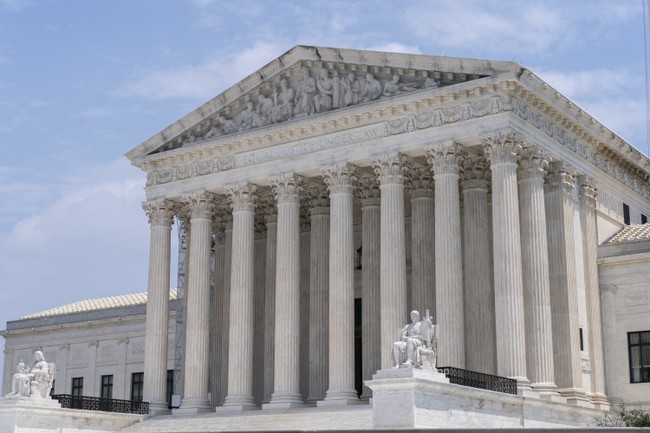
Snyder v. United States was a case that might have gone unnoticed in a different year. But this is an election year with one of the left’s loudest talking points being attacks on the Supreme Court’s legitimacy, particularly attacks on Justice Thomas and Justice Alito. After reading the majority opinion and Jackson’s dissent, it was clear that “Snyder” would not be viewed as the majority protecting the rights of an accused re: reading a criminal statute narrowly – rather it would be viewed as further evidence (by the left) of corruption on the court.
The Associated Press reported that Snyder was convicted of “bribery.” The crime Snyder was charged with was not a “bribe” in the strict sense of that word; rather, it was charged as an illegal post-act gratuity. One can argue over the distinction between taking a bribe and accepting a gratuity, but those acts are distinct.
The LA Times headline breathlessly reported that the court “Wiped out anti-corruption law that bars officials from taking gifts for past favors.” That is not what the court did. The majority interpreted a criminal statute narrowly. Nonetheless, the interpretation of Snyder by those on the left will be to relate it to the phony controversy surrounding Thomas and Alito. The left doesn’t like that Thomas and Alito have rich friends. The LA Times wrote:
The Supreme Court justices have faced heavy criticism recently for accepting undisclosed gifts from wealthy patrons. Justice Clarence Thomas regularly took lavish vacations and private jet flights that were paid for by Texas billionaire Harlan Crow. Justice Samuel A. Alito Jr. took a fishing trip to Alaska in 2008 aboard a private plane owned by Paul Singer, a hedge fund billionaire.
The case was about criminal statute interpretation. Kavanaugh, writing for the majority, explained:
Although a gratuity or reward offered and accepted by a state or local official after the official act may be unethical or illegal under other federal, state, or local laws, the gratuity does not violate §666.
In short, the court was saying, “You charged Snyder with the wrong crime.”
In the 6-3 decision, the court reversed and remanded a criminal conviction of James Snyder, former mayor of Portage, Indiana. In 2013, Portage awarded contracts to Great Lakes Peterbilt for trash truck purchases. Five trucks were purchased for $1.1 million. The next year, Peterbilt paid Snyder $13,000. Snyder said that it was for past consultation. The DOJ charged Snyder under USC §666(a)(1)(B) for accepting an illegal gratuity.
The decision to reverse and remand was based on language incongruities in §666(a)(1)(B). As noted, Snyder could have been charged under a different statute and potentially convicted. Because it is a criminal statute, the majority was circumspect in how the specific statute could be applied.
For example, the court noted:
[A]ccepting a bribe as a federal official is punishable by up to 15 years in prison, while accepting an illegal gratuity as a federal official is punishable by up to only 2 years. If the Government were correct that §666 also covered gratuities, Congress would have inexplicably authorized punishing gratuities to state and local officials five times more severely than gratuities to federal officials—10 years for state and local officials compared to 2 years for federal officials.
Punishing a local public official with vastly more prison time than a federal official doing the same thing makes no sense.
Justice Gorsuch, writing in a short concurrence, noted:
But the bottom line is that, for all those reasons, any fair reader of this statute would be left with a reasonable doubt about whether it covers the defendant’s charged conduct. And when that happens, judges are bound by the ancient rule of lenity to decide the case as the Court does today, not for the prosecutor but for the presumptively free individual.
Justice Jackson penned the dissent, with Justices Sotomayor and Kagan joining. She wrote:
As a general matter (and setting aside for the moment that §666 covers only officials who act “corruptly”), everyone knows what a reward is. It is a $20 bill pulled from a lost wallet at the time of its return to its grateful owner. A surprise ice cream outing after a report card with straight As. The bar tab picked up by a supervisor celebrating a job well done by her team. A reward often says “thank you” or “good job,” rather than “please”.
Jackson’s snide swipe at the majority will be red meat to the left. She wrote:
Snyder’s absurd and atextual reading of the statute is one only today’s Court could love.
It is obvious that was aimed at Thomas and Alito, although neither wrote the opinion. Bottom line: Congress can amend §666 to make it clear that acts like what Snyder did are illegal. What will come of this is bad faith actors pointing at the court and claiming that Snyder is another example of the high court defending corruption. Rather, it is SCOTUS defending liberty and requiring Congress to define criminal statutes with clarity and specificity.